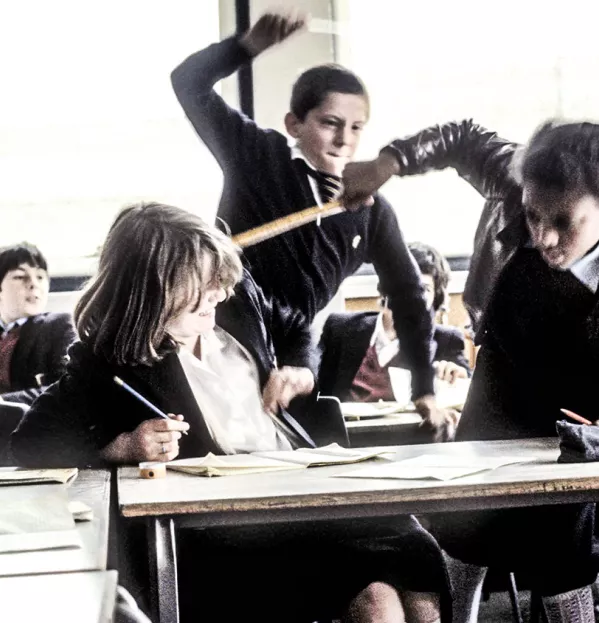Rise in violence towards primary support staff

More than a quarter of primary school support staff report pupils have been physically aggressive and violent towards them during the course of the previous year, including “squaring up”, “punching”, “kicking”, “headbutting” and “using weapons”.
The figures - revealed in new research published by the Scottish government into behaviour in schools last week - show that violence and aggression towards primary support staff is at its highest level since the government started to collect this data in 2006.
Twenty-seven per cent of primary support staff who took part in a survey, which was conducted last year, reported they had experienced physical aggression, including “pushing” and “squaring up”, in the past 12 months, while 26 per cent of primary support staff reported they had experienced physical violence, including “punching”, “kicking” and “headbutting”.
Of the 400 primary support staff surveyed, 11 per cent said that they had experienced six or more incidences of pupil violence in the previous year. Around 13 individuals said the violence they had experienced involved the use of a weapon.
More than 4,000 headteachers, teachers and support staff across primary and secondary took part in Behaviour in Scottish Schools Research 2016. Previous waves took place in 2006, 2009 and 2012.
In 2012, just 11 per cent of support staff reported being victims of pupil violence, while 13 per cent reported they had experienced aggression from pupils.
The figures for violent incidents involving secondary support staff were low by comparison. Of the 600 secondary support staff who took part in the survey, 11 per cent reported they had been victims of pupil aggression in the past 12 months and 4 per cent reported pupil violence towards them personally.
Primary teachers were also less likely to report pupil violence or aggression towards them, with 9 per cent and 13 per cent reporting incidents in the past year.
Overall, support staff perceived pupil behaviour to be worse than teachers or headteachers. Seventy-nine per cent of primary support staff reported that all or most pupils were generally well-behaved during lessons, as compared with 99 per cent of primary headteachers and 87 per cent of teachers.
‘Challenging individuals’
The researchers suggested that support staff perceived pupil behaviour to be worse because they “often work with the most challenging individuals or small groups.” They also suggested that training for support staff in behaviour management could be an issue.
The report continued: “Differences between staff groups may also reflect levels of training and support received to manage relationships and behaviour as well as different levels of involvement in meetings and discussions around behaviour.”
Earlier this year Unison Scotland - one of the unions that represents support staff in schools - said that support staff were feeling exhausted, undervalued and stressed.
Unison said 1,841 jobs supporting teachers in schools had disappeared since 2010. The posts included classroom assistants.
Responding to the rise in pupil violence towards support staff Unison Scotland spokesman Danny Phillips told Tes Scotland cuts had led to the remaining support staff in schools - including classroom assistants and additional support needs assistants - being asked to carry out jobs they lacked the training to take on. He said: “Pupil support assistants generally have to deal with the pupils who get more frustrated or who are more difficult to deal with. For instance, they are often the ones who are asked to take a child who is being disruptive out of the class to calm down but the resources that are necessary to fully support these children are not there.
“Our members often suffer from a lack of training and increasingly are being asked to carry out jobs they might have only have had a quick lesson in - including things like administering medication.”
Overall, the researchers found that there had been “little change in serious disruptive behaviour in either primary or secondary schools”.
However, they identified a rise in “low-level disruptive behaviour in primary schools” during the past four years, with school staff blaming digital technologies, parenting and budget cuts (see box, above).
Staff also reported that falling numbers of support staff - coupled with the increase in the number of pupils with additional support needs - was resulting in a lack of one-to-one support and having “a wider negative impact on pupils’ behaviour”.
A Scottish government spokesman said that no one wanted to see incidences of violent and aggressive behaviour in schools. The spokesman added that the vast majority of pupils were “generally well-behaved” and that violence remained “very rare”.
He continued: “Although the vast majority of the research findings are positive, we recognise that the report highlights areas where improvements can be made.”
You need a Tes subscription to read this article
Subscribe now to read this article and get other subscriber-only content:
- Unlimited access to all Tes magazine content
- Exclusive subscriber-only stories
- Award-winning email newsletters
Already a subscriber? Log in
You need a subscription to read this article
Subscribe now to read this article and get other subscriber-only content, including:
- Unlimited access to all Tes magazine content
- Exclusive subscriber-only stories
- Award-winning email newsletters